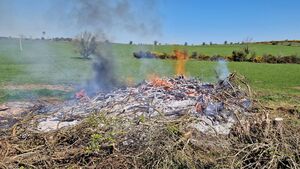Waterford Council warns burning of agricultural waste can lead to prosecution

Burning waste, including green waste, can lead to the emission of particulate matter, a form of air pollution, which can exacerbate breathing difficulties in people with lung conditions such as asthma or emphysema.
Waterford City and County Council wishes to remind landowners that the burning of waste, including garden and agricultural waste, is banned and can lead to prosecution for landowners if it is undertaken.
Under the Waste Management (Prohibition of Waste Disposal By Burning) Regulations 2009 a person who burns any waste can face prosecution and a fine of up to €5,000 in the District Court.
Niall Kane, Senior Executive Engineer with Waterford City and County Council, said, “There was an exemption from the ban on burning agricultural waste up until 2023, however, this is now also banned.
"Farmers should use management techniques, such as regular flailing to minimise the production of the green waste and alternative measures, such as mulching or composting the material, or using it to create a nature and biodiversity pile are suitable alternatives to burning.”
Mr Kane added, “Burning waste, including green waste, can lead to the emission of particulate matter, a form of air pollution, which can exacerbate breathing difficulties in people with lung conditions such as asthma or emphysema.”
Financial support is available to farmers for biomass chipping equipment.
The Department of Agriculture, Food and the Marine, through the Targeted Agriculture Modernisation Schemes (TAMS 3), provides grants to farmers for a wood/ biomass drying shed and for PTO-driven wood/biomass chipper equipment.
This equipment can be used by farmers to process agriculture green waste on farms.






